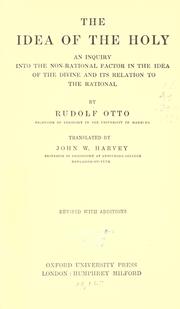

Finally, the constitutive role of the sacred is examined for the background of cultural frames and with a view to the unconscious and non-agentive drivers of global processes. The third part illustrates varieties of the global sacred by looking at the democratic imagination and the politics of humanitarian reason. Symbols of peace, reconciliation and order originate in violence.

Taking the lead from mimetic theory, the second part looks at the ambivalent sources of the sacred.

Shifting the vantage point towards extraordinary politics of liminal globality, the first part captures borderline experiences where political reality is broken and markers of certainty dissolve. The influence of Otto’s views still influences theological, religious, and philosophical discourse to date.This article argues that quests for sacrality are creative forces in the formation of collective identities in the global age.

Otto felt people should first do a serious rational study of God, before turning to the non-rational element of God as he has done in his own work ‘The idea of Holy’. They are used to explain numinous to show its uniqueness and separation from normal human experiences. Terminologies like Ganz Andrere and sui generis which respectively mean completely different and incomparable. It is something totally different and incomparable whereby a person finds him/herself in an uncomfortable state of mind. For him, it is rather an irrational and non-sensory feeling. He argues r eligious experiences are qualitatively different from other emotions. Is numinous something rationalĪccording to Otto, numinous has nothing to do with rationale, human intellect, and sense. He defines it as a uniquely intensive emotional experience that is common to all organized religions of the world. In his most famous written work,’ The ideas of the Holy, Rudolph Otto argues ‘numinous’ is the defining element of any religious experience. His concept of numinous about religion gave him fame and popularity as an established scholar on religion and science. Rudolf Otto (1869–1937) is one of the most influential scholars on religion of the early twentieth century.


 0 kommentar(er)
0 kommentar(er)
